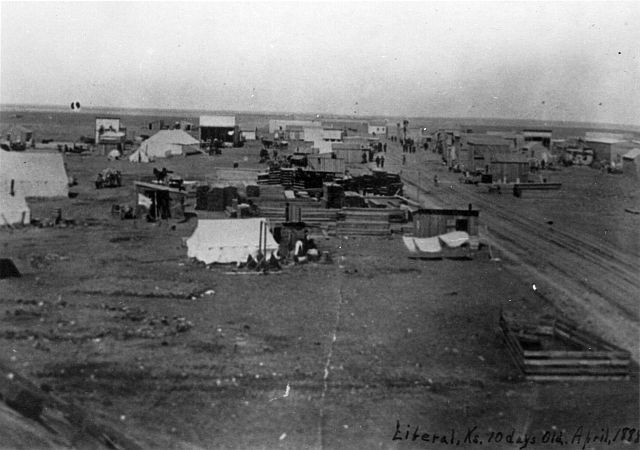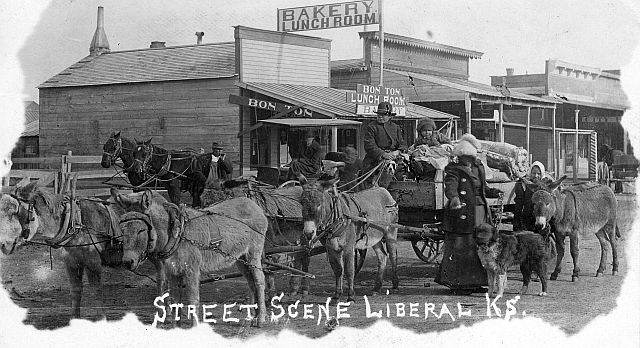
"THAT’S LIBERAL'' NAMES THE TOWN
From the Guymon Daily Herald, April 28, 1964
Years ago before the Rock Island railroad extended the gleaming steel lines that tied the great new Southwest to the older ''back east" long and lonely was the trail from Dodge City, the rail terminal, to the Panhandle country of Texas and Oklahoma and the southwest corner of Kansas.
Many a time the weary pioneer's eyes grew faint as he scanned the horizon for the silhouette that meant an oasis in the desert of short grass country—the little sod house with the wire corral and the water tanks, crude and simple yet conjuring a vision of hospitality, rest and water.
Water was so scarce that many ranchers and settlers along the way felt justified in charging for it, to conserve the small supply from low-capacity wells and as partial recompense for the hours of toil that had gone into the tedious job of digging the well by hand.
But at one lonely ranch on the long trail, strangers were always welcome. Water was given freely just as though the little sod house and its surroundings did not show many needs which money might have remedied. When asked what the charges were—as he often was—S.S. Rogers, the genial ranchman, would replay, ''Oh that's alright. Water's always free here." Often as not the reply was, "Well, that's right liberal."
Year after year this well, located just a mile west of the heart of downtown Liberal today, became known throughout the area. Many trails were directed so as to pass its kindly gates. Plainsmen soon learned to speak of it as ''The Liberal well," and finally simply as ''Liberal.''
So, when the government established a pony express post office at the ranch home, it already had unconsciously been named.
Years passed, settlers came west, the railroad brought commerce and a new civilization to these Western plains. Open prairie blossomed into a thriving little town of streets and buildings and friendly people.
But the name Liberal—and more, the spirit so humbly symbolized in the hospitality of the simple ranch home—have remained.
You’ll find something—perhaps a spirit of quick interest in you and yours, an easy friendliness, a way of life that combines the far-famed hospitality of the Old West with the up-and-doing progressiveness of Today-and-Tomorrow. You’ll like it. And if you can’t find words to describe this intangible something, it may help to recall the words of the plainsmen who trod this very ground: “That’s Liberal.”
Early History
from the Southwest Daily Times, Kansas State Historical Society, The Liberal News of December 29, 1892 and a thesis by Ella Penny

Liberal first existed as a post office which was located a mile west of the present city on what is now Second Street. Later a store, school and a real estate office were added. When the railroad came this far west the town was located at the present site. The plat was signed by the Kansas Town and Land Company, M.A. Low, President; Edwin Sandison, agent.
When Sandison arrived, April 18, 1888 to sell town lots, buyers met him as far east as Bucklin to get the better locations. Mr. Sandison had a plat of the town and the buyers would point to certain lots and buy them without ever having seen the location. Corner lots on Main Street brought $1,200, center lots $1,000. It is reported that Sandison sold $300,000 worth of lots in 30 days.
A tent city soon sprung up on the site. People living a mile west, at present Western Avenue and Second Street, at the point that had been called "Liberal" for many years (it was Liberal Precinct as early as 1885) moved into the new town on the railroad.
Arkalon businessmen were offered a tax inducement to move to Liberal along Lincoln Street from Third Street to Fourth Street. This was known as "Arkalon Row" as most of the houses were moved from Arkalon and the people living in them had formerly lived there.
The Liberal post office was established June 1886 with Mrs Addie J Mason as the postmistress. Liberal was incorporated as a third class city on July 30, 1888.
In 1892, the editor of The Liberal News, pridefully pointed out that Liberal had at the time: one hotel, relief corps, a brass band, a G.A.R. lodge, two attorneys, one physician, one drug store, one paint shop, two coal yards, the county seat, two restaurants, one barber shop, a Masonic lodge, one city transfer, one lumber yard, a car repair shop, one meat market, one photographer, Ladies' Aid Society, Eastern Star lodge, one carpenter shop, three livery stables, two clothing stores, one dry goods store, three grocery stores, tow furniture stores, two millinery stores, one church building, one blacksmith shop, two hardware stores, an A.O.U.W. lodge, one wagon repair shop, two implement dealers, a money order post office, two boot and shoe stores, a seven-stall round house, three church organizations, Christian Endeavor Society, a flourishing Sunday School, Modern Woodmen of America, one dressmaking establishment, two newspapers, the end of the Rock Island railway division, and a $12,000 school building with three teachers and a school population of 100.
From Morse Code Telegraph to Operator-less Long Distance in 90 Years
For younger people who have known nothing but cell phones as a means of communication, early day telegraphic and telephonic communications must appear as modern as carrier pigeons or messages in a bottle. Don Corbin compiled the following information in 1979 from verbal accounts by L.A. Helsel of Pratt and Ray Millman of Liberal on September 8, 1955; a newspaper article, “Phones here Preceded by Telegraph in Early Days,” by Harry Chrisman published in the Southwest Daily Times of May 5, 6 & 7, 1960; The Liberal District Manager report of January 27, 1961; and Southwest Daily Times of April 20,1979, p 1.
Before the beginning of the first telephone exchange in Liberal, a local group established their own communication system. They installed a direct wire to the Rock Island depot at their places of business and, in a few instances, at their homes. Communication was possible through the use of the Morse code.
Ray Millman, editor of several Liberal papers, reported that this line connected his newspaper office and residence to the Rock Island depot. The telegraph system was probably introduced somewhere between 1898 and 1900 about the time E.L. Cloud was the Rock Island agent. Mr. Cloud often helped Mr. Millman get out the weekly paper. The two men and other residents dreamed up the telegraph system. Also on the line were Dr. George S. Smith and his brother, Thomas J. Smith, with a line to the doctor's home and one to the corner drug store.
The first local, rural, and long distance telephone exchange developed from this effort. It was owned and operated by Dr. Smith and his brother. The first telephone directory, 1907-1908, bore the signature on the title page of "George S. Smith and Bro. Proprietors."
In the year 1909-1910, L.W. Stevesson took over the enterprise from the Smiths and neighboring communities were served: Rose Valley Line, Cimarron Line, McAlister Line, Sharp's Creek Line, and so forth. Calls were put through by the caller ringing the necessary number of rings. The wires to farms and ranches were often the top wire of a barbed wire fence; so if reception was not always perfect, no one complained. Other neighboring lines listed were Granger Telephone Club, Arkalon Line, Shorb Line, Hugoton Line, Adult Line, Boles Line, Grand Valley Line, Eureka Line, Brown's Line, and Blue Bell Line.
Long distance toll lines had been established at Arkalon, Beaver City, Bucklin. Couch, Dombey, Dodge City, Englewood, Floris, Fowler, Guymon, Grand Valley, Greensburg, Hibbs, Hugoton, Lorena, Meade, Minneola, Plains, Pratt, Santa Fe, Shattuck, San City, Tyrone, Texhoma, Woodward and Hooker.
During October 1927, Stevesson sold his interest to James Thompson who operated the company with the same name of the Liberal Telephone Company. In 1928, Thompson built a copper toll circuit to Grover, Texas, to connect with Amarillo, Texas. Also during 1928, two additional circuits were added to the Liberal-Dodge City line.
In April 1930, Thompson consolidated Liberal and Plains, Kansas, and Hooker, Oklahoma, into Southwestern Telephone Company which remained as that name until it was absorbed by Southwestern Bell on December 31, 1952. Those exchanges taken over by Southwestern Bell at that time included Pratt, Greensburg, Bucklin, Coldwater, Minneola, Fowler, Meade, Plains, Liberal and Hooker, Oklahoma.
There were no advertisements noted in the first telephone directory. However, by the issue of 1909 many advertisers were included in the new directory which was soon to be issued annually. From 14 pages of a small booklet, the directory grew in the following 10 years to 48 pages. More than 100 exchanges were listed and the rates published. The first directories put out by the Liberal Telephone Exchange devoted considerable space explaining the use of the telephone. The Yellow Business Classified pages had been started in 1925 and in 1960 were a considerable portion of the directory. From 239 urban and 105 rural subscribers in 1907-1908 the numbers had grown to 774 town and country telephones by 1918. In 1961, there were 7,276 telephones in service in Liberal.
The company's system and its complexity can best be described with statistics about poles and cable. In 1961, the company had 300,042 feet (nearly 57 mites) of aerial cable, 63,984 feet (over 13 mites) of underground cable and a total of 3,701 telephone poles in the local system.
The miracle of the modern age is becoming so commonplace that the people who use the thousands of telephones in Liberal take for granted the presence and almost automatic services of Southwestern Bell Telephone. The telephone company's accepted convenience typifies Liberal's remarkable progress story, and statistics of many sorts tend to back up just about any angle one might present on Southwestern Bell Telephone Company.
However, progress has a price tag as noted in the Southwest Daily Times, April 20, 1979:
At midnight tonight, 30 Southwestern Bell telephone operators no longer have a job tending the switchboard—every operation will be fully automated, thanks to zero plus dialing.
Effective April 21, long distance calls in Liberal that require operator assistance are handled through operators in Hutchinson and Wichita.